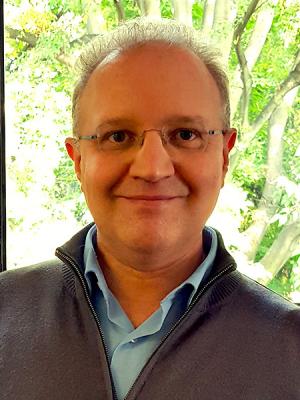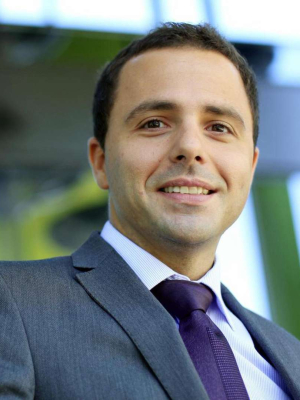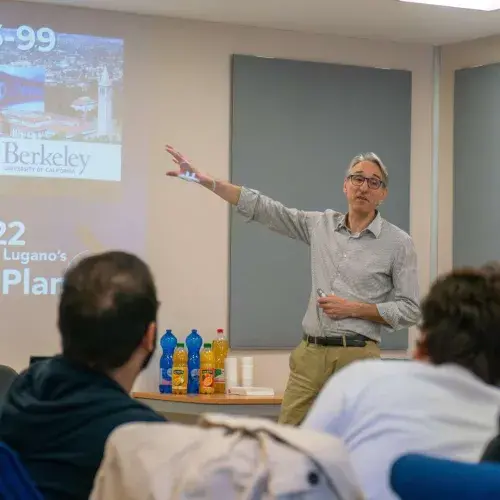What sets a business apart? What makes your investment sustainable and profitable in the long run? How do I start my business?
The division of Business and Economics (BE) focuses on equipping students with the necessary skills, knowledge and competencies to deal with current economic and business challenges.
Our programs equip students with an interdisciplinary and rigorous approach grounded on the principles of the liberal arts, to enable them to take key decisions in a rapidly changing economic environment. Combining guest lectures from industry experts, field projects and research workshops, faculty help students develop a rigorous and up-to-date knowledge on the most challenging and compelling topics on business and economics.
Our educational programs stress both theoretical and applied concepts, quantitative and qualitative reasoning, communication skills, and basic computer literacy. We challenge students to integrate and apply concepts, frameworks and critical thinking to current, real-world management scenarios.
The BE division offers five majors: in the area of Economics and Finance, students can choose majors in Finance, in International Economics and in Political Economy; In the area of Management, students can choose International Management and International Marketing Management. In addition, we present minors in Economics, Management, Finance and Marketing.
Students with degrees from BE have gone on to graduate school to further deepen their studies; to multinational companies in several industries (e.g. fashion, fast-moving consumer goods, automotive), to consultancy firms, banks and other financial institutions.
HIGHLIGHTS
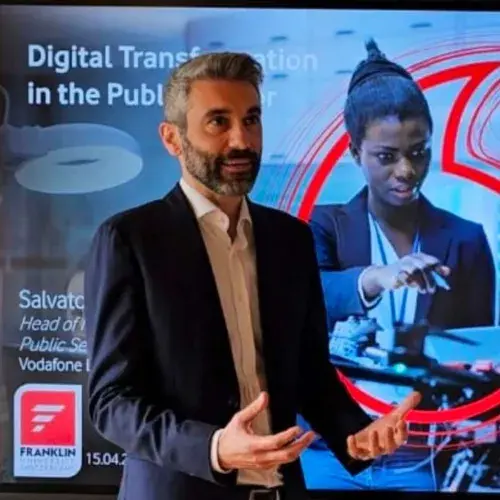
Vodafone's Digital Transformation
Salvatore Caramano, a representative from Vodafone, came to educate Master of Science in International Management (MSIM) students about the impacts of their transformative shift from a standard approach to a more digital-focused strategy. As a Vodafone salesman, Caramano discussed the new technologies that are facilitating this transition. This collaboration was organized by the Division of Business and Economics as a way to support its graduate students by enriching their education with real industry professionals.
FEATURED PUBLICATION
Managing Sustainable Luxury and Digitalization
Mario D. Schultz, Assistant Professor of International Management at Franklin University Switzerland, and Peter Seele, Professor at Università della Svizzera italiana (USI), explored the concept of 'retouched luxury' in their new book published by Routledge, 'Managing Sustainable Luxury and Digitalization: Technology Trends and Ethical Challenges in the Swiss Luxury Watch Business.' The book offers fresh transdisciplinary insights into luxury, examining the current trend of digitally altered (censored) and blockchain-verified (censored) luxury watches. It also discusses the broader implications for luxury studies and managerial practice.
Next to launching their new book, the authors also introduced their newly founded Luxury Observatory Lugano (LOL). This new research center is described as an “observatory on luxury studies at the intersection of business and philosophy.“ The research lab and the book aim to benefit academics, scholars, and students in management studies, particularly those interested in luxury industries, luxury management, business ethics, digital transformation, and the philosophical underpinnings of luxury.
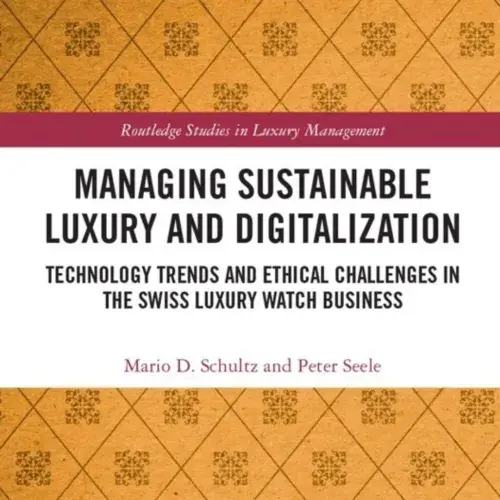
Students & Alumni
Beata Kanka '18
Studying economics at Franklin was an influential and path-changing experience. I had never planned to major in economics. However, the introductory economics courses made such a strong impression on me and aroused my interest to the extent that I decided - even to my surprise - to add economics as a second major.
Excellence and devotion from the part of the faculty provided me with both an in-depth knowledge and an enjoyable learning experience, not to mention the academic travel to India and Bhutan, where we had the chance to examine economic issues firsthand. I feel enriched by acquiring such a diverse and quality education.
James Jasper '11
In the rapidly changing world of business and finance, a great education in economics makes you truly valuable to any enterprise. Franklin's Department of Economics provides just that--not only are high-level theories of banking and economics discussed in detail, instructors focus on strategic decision making and business level analysis as well. Regardless of whether students enter large firms or start-ups, they will make a meaningful contribution to their organization and be prepared with the knowledge needed to grow in their positions. In my own career as a Business Intelligence Analyst at Sebonic Financial, the knowledge provided by my economics courses has allowed me to effectively control point-of-sale pricing for a multi-million dollar company while also positioning me to execute on the strategic growth plan. Focusing on breadth and depth of knowledge, the department trains students to excel in the modern world.
Fahd Arnouk '11
My experience with the Department of Economics at Franklin was both eye-opening and rewarding. I learned the importance and impact of individuals like John Maynard Keynes on modern economic thinking, and I was also taught the essentials of corporate finance and statistical modeling. By the time I graduated in 2011, I felt well-versed in how important concepts like monetary policy and stock price valuation were in international markets. Having that solid foundation helped ease the transition into my graduate studies in management at King's College London, and will no doubt help me now as I am looking to start my career.
Faculty within the BE division combine high-level research and applied and practical experience in their teaching activities, making each course updated and able to tackle real-world issues. They will empower students by providing them with the tools and instruments to build a successful career. By advising and mentoring students, faculty will help each one to grow and become a global business leader able to make a real impact in any endeavor.
We invite you to peruse our individual faculty profiles for more information or check out the publications section below to see some of our recent scholarships.
Division Chair
Full-time Faculty
Part-time Faculty
Discover all the latest BE division events, projects, activities, and accomplishments. Our faculty publish volumes, attend and organize conferences, arrange workshops and guest lectures, creating new knowledge, learning opportunities and initiatives for the University and their students. In addition, they are award-winning dedicated academics who further contribute to their field of expertise and enhance their skills and competencies.
The Franklin Frank
In the Spring of 2014, the Economics and Finance Department launched a new currency as part of an educational initiative. This currency is called the Franklin Frank (FRF).  Post-emergence of COVID-19, the program has adapted to better accommodate the changes required by the pandemic. The Franklin Frank Community Engagement program invites Franklin University students to contribute their time to volunteer work within the school community and in the greater Ticino area. In exchange for their service, students receive Franklin Franks with which they are able to trade in for class credit in selected courses, or trade amongst classmates. The primary goal of this program is to raise awareness among students about the importance of service learning, as well as to strengthen our Franklin identity. In addition, the program will educate participants on various economic features through the Franklin Frank based “economy” and its functioning.
Post-emergence of COVID-19, the program has adapted to better accommodate the changes required by the pandemic. The Franklin Frank Community Engagement program invites Franklin University students to contribute their time to volunteer work within the school community and in the greater Ticino area. In exchange for their service, students receive Franklin Franks with which they are able to trade in for class credit in selected courses, or trade amongst classmates. The primary goal of this program is to raise awareness among students about the importance of service learning, as well as to strengthen our Franklin identity. In addition, the program will educate participants on various economic features through the Franklin Frank based “economy” and its functioning.
Our many faculty members’ publications range from academic journals, case studies, scholarly writings, book chapters and more with a cross-disciplinary perspective. They conduct innovative and pioneering research, spanning diverse insights, integration and application, while being actively engaged in the creation of intellectual exchange and education
Highlighted
Other Publications
Dudukovic S. (2021) “Cascade volatility model does not produce Gaussian residuals”, Forthcoming in " Journal of Finance and Accountancy, Vol. 29, March
Dasgupta, P. “Using travel to teach Sustainable Economic Development” Chapter in ‘Reteaching economics - experiences from plural socio*economic higher education’. Springer VS. 2020
Miniero, G. (with M & F.Ricotta). Value co-production made easy: the role of fantastical thinking. European Journal of Marketing.
Miniero, G. (with M. Bonera, A. Codini, A) “The great Millennials’ trouble: leading or confused green generation? An Italian insight.” Italian Journal of Marketing, 2020(4), 289-308.
Miniero, G. (with M. Pizzetti, A.Baccelloni, F. Ricotta) “Design Thinking for Food Well being: an adolescent language perspective”, in Design Thinking for Food Well Being, Edited by Batat, W, Springer New York, forthcoming
Miniero, G. (with C. Holst)“Corporate Communication and the Arts: The Mistake of not engaging”, in Managing the Cultural Business Avoiding Mistakes, Finding Success. Edited by Addis, M., Rurale, A, Routdlege,
Dudukovic S.2019. “Evaluating Realized Volatility Models with Higher Order Cumulants: HAR-RV Versus ARIMA-RV”. In H.Bilgin, M., Danis at al (eds). Eurasian Business Perspectives. Eurasian Studies in Business and Economics, Springer Nature-Switzerland. pp 315-336. DOI: 10.1007/978-3-030-11833-4
Dudukovic S.2019." Inverse Time Series approach to Non-Gaussian GARCH-ARMA FX Volatility Modeling ", Paper presented and published in Conference Proceedings, EBES 28th, London May 28-31, 2019.
Terzi, A. (2019). The rise of national central banks' TARGET balances in the euro area: a comment. European Journal of Economics and Economic Policies: Intervention, 1, 1-8.
Dudukovic S.(2018) ." Micro and Macro Determinants of Stock Prices and their Volatility - The Case of International Oil Companies", Presented at 25th EBES Conference and published in the Proceedings, Berlin May 23-25, 2018.
Dudukovic S.(2018) .”A new approach to Economic & Financial non-Gaussian Time Series Modeling and Forecasting”. 1st Vienna Workshop on Economic Forecasting Feb. 15-16, 2018. Institute for Advanced Studies Vienna (IHS).Poster section.
Miniero, G. (with M. Addis, F. Ricotta)“Building brands through experiential events: when entertainment meets education”, African Journal of Business Management, vol 12 (20),pp 596-608
Miniero, G. (with M. Addis, I. Soscia)“Facing contradictory Emotions in Event Marketing”, Journal of Consumer Marketing, vol 35 issue 2
Miniero G. (with A. Codini, M. Bonera) “ Why not promote promotion for green consumption? The controversial role of regulatory focus”. European Business Review, 30(5), 554-570.
Dudukovic S. “Does Multiplicative Seasonal Volatility Model Outperform Cascade Volatility Model? Evidence from Forex Market”. Presented at 22 EBES conference in May, Italy at the University “LA Sapienza”, 2017
Miniero, G. (with F. Ricotta, M. Addis) ” Personalizzazione vs Semplificazione: ottimizzare la differenziazione divertendosi” Non c’è più il marketing di una volta. Scritti in ricordo di Gennaro Cuomo, Cedam
Miniero, G. (with P. Caiozzo, M.C. Cito) “Venditore si nasce? Il mestiere visto dagli studenti”, Economia e Management, vol 1
Miniero, G. (2017) “Nuove frontiere dell’esperienza di consumo: il ruolo della fantasia”, Egea ISBN: 978-88-238-4576-3
Miniero, G. (with A. Codini, M. Bonera) “Time horizon and green consumption” Mercati e Competitività, vol 1
Miniero, G. (with M. Addis) “Come aumentare il ritorno della personalizzazione dei prodotti?” Ideas of Management, SDA Bocconi Business School, July
Terzi, A. (2016). In the absence of fiscal union, the Eurozone needs a more flexible monetary policy: A comment. PSL Quarterly Review - Economia Civile, 69(278), 279-285.
Terzi, A. (2016). A T-shirt model of savings, debt, and private spending: lessons for the euro area. European Journal of Economics and Economic Policies: Intervention, Edward Elgar Publishing, 13(1), 39-56.
Miniero, G. (with M. Bonera, A. Codini, E. Corvi, G. Bertoli) “Stimolare le scelte di consumo green”, Micro e Macro Marketing, vol 1
Miniero,G. (with M. Addis, F. Ricotta) “Personalizzare l’offerta con successo: il ruolo della fantasia”, Economia & Management, vol 1







